Sociology Report: Psychosocial Factors and Alcohol Consumption
VerifiedAdded on 2022/09/06
|47
|12111
|25
Report
AI Summary
This report investigates the psychosocial factors influencing alcohol consumption among young adults in the United Kingdom. It begins by defining key terms like alcohol, alcohol consumption, psychosocial factors, and young adults, setting the stage for an exploration of the issue. The background section highlights the challenges researchers face in explaining diverse alcohol consumption behaviors, from experimentation to dependence, and the role of family history and other psychosocial factors. The problem statement focuses on the impact of these factors on alcohol consumption among UK young adults, touching on vulnerabilities, environmental influences, and associated disorders. The justification emphasizes the negative consequences of alcohol overuse, particularly the high mortality rate among young adults, while the significance underscores the importance of understanding factors like family history, parenting, and stress reduction. The report reviews existing literature, exploring various factors that lead to alcohol consumption and its continuation. The methodology section outlines the philosophical underpinning, data collection methods, sources, search items, and inclusion/exclusion criteria. It also discusses data analysis techniques, ethical issues, and limitations. The report includes findings, discussions, conclusions, and recommendations. The study emphasizes that psychosocial factors, including family linkages and social influences, are critical in understanding the increasing use of alcohol among the young generation in the United Kingdom. The report is a comprehensive analysis of the topic, contributing to a deeper understanding of the problem and providing a basis for future research and interventions.
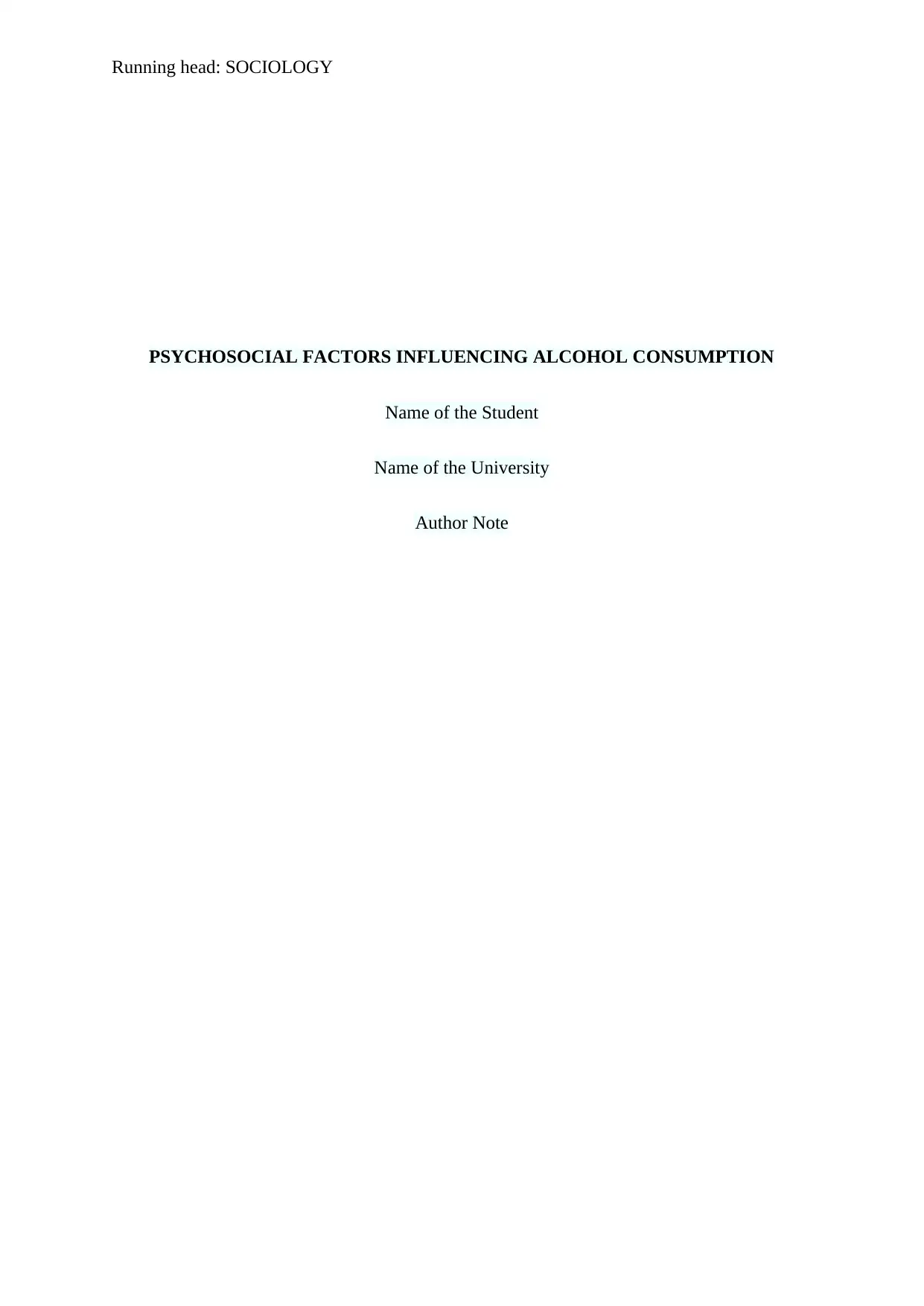
Running head: SOCIOLOGY
PSYCHOSOCIAL FACTORS INFLUENCING ALCOHOL CONSUMPTION
Name of the Student
Name of the University
Author Note
PSYCHOSOCIAL FACTORS INFLUENCING ALCOHOL CONSUMPTION
Name of the Student
Name of the University
Author Note
Paraphrase This Document
Need a fresh take? Get an instant paraphrase of this document with our AI Paraphraser
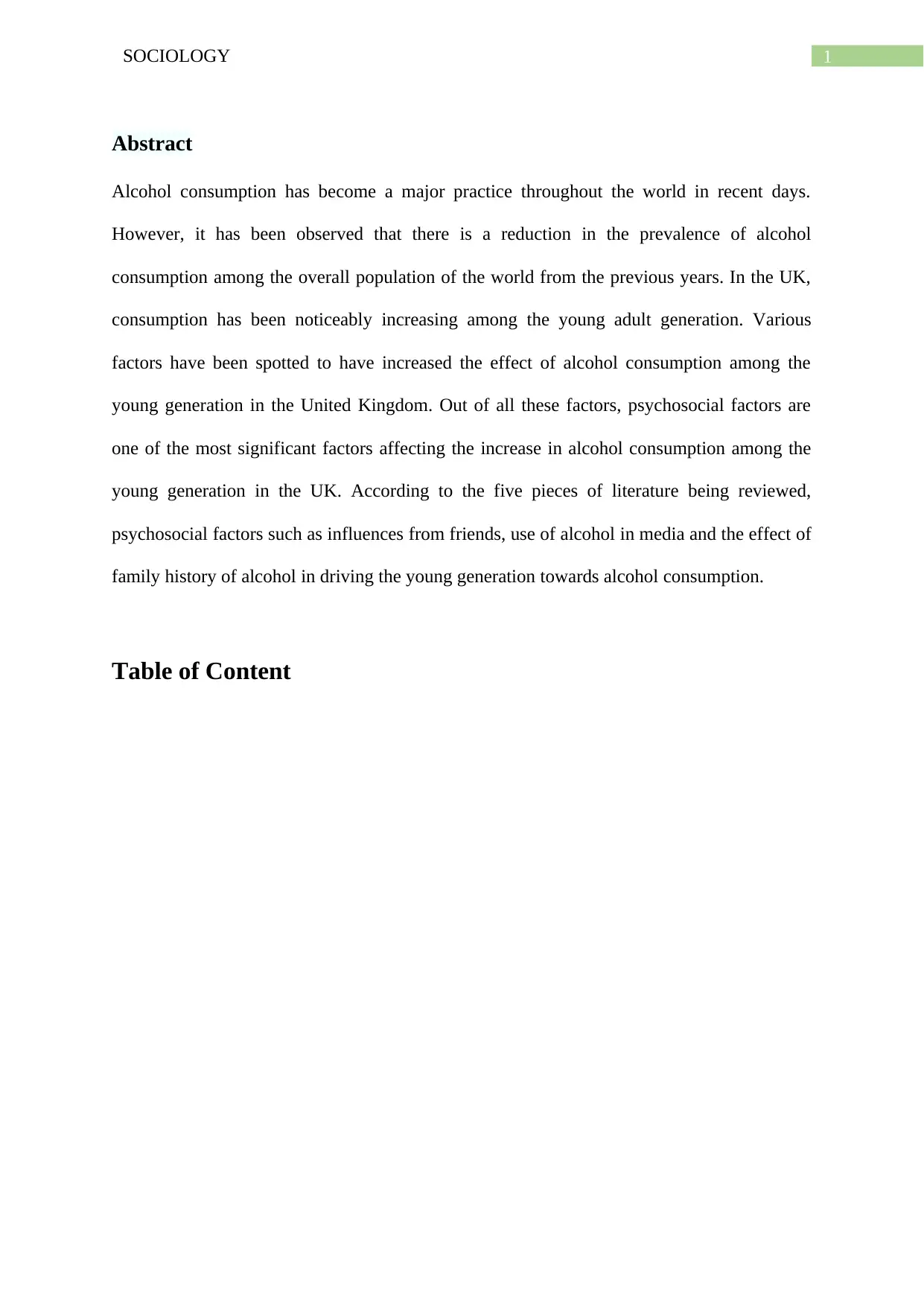
1SOCIOLOGY
Abstract
Alcohol consumption has become a major practice throughout the world in recent days.
However, it has been observed that there is a reduction in the prevalence of alcohol
consumption among the overall population of the world from the previous years. In the UK,
consumption has been noticeably increasing among the young adult generation. Various
factors have been spotted to have increased the effect of alcohol consumption among the
young generation in the United Kingdom. Out of all these factors, psychosocial factors are
one of the most significant factors affecting the increase in alcohol consumption among the
young generation in the UK. According to the five pieces of literature being reviewed,
psychosocial factors such as influences from friends, use of alcohol in media and the effect of
family history of alcohol in driving the young generation towards alcohol consumption.
Table of Content
Abstract
Alcohol consumption has become a major practice throughout the world in recent days.
However, it has been observed that there is a reduction in the prevalence of alcohol
consumption among the overall population of the world from the previous years. In the UK,
consumption has been noticeably increasing among the young adult generation. Various
factors have been spotted to have increased the effect of alcohol consumption among the
young generation in the United Kingdom. Out of all these factors, psychosocial factors are
one of the most significant factors affecting the increase in alcohol consumption among the
young generation in the UK. According to the five pieces of literature being reviewed,
psychosocial factors such as influences from friends, use of alcohol in media and the effect of
family history of alcohol in driving the young generation towards alcohol consumption.
Table of Content
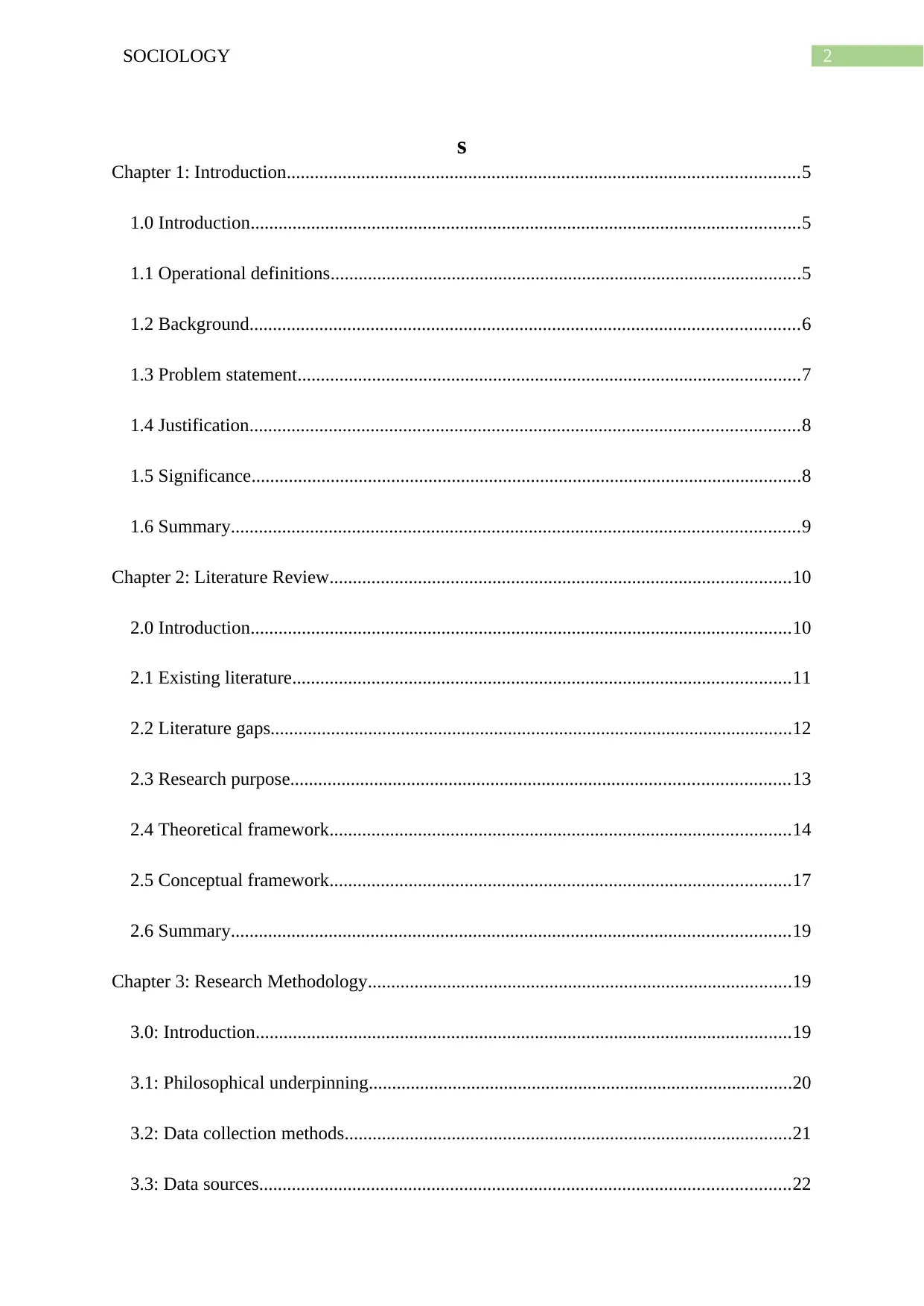
2SOCIOLOGY
s
Chapter 1: Introduction..............................................................................................................5
1.0 Introduction......................................................................................................................5
1.1 Operational definitions.....................................................................................................5
1.2 Background......................................................................................................................6
1.3 Problem statement............................................................................................................7
1.4 Justification......................................................................................................................8
1.5 Significance......................................................................................................................8
1.6 Summary..........................................................................................................................9
Chapter 2: Literature Review...................................................................................................10
2.0 Introduction....................................................................................................................10
2.1 Existing literature...........................................................................................................11
2.2 Literature gaps................................................................................................................12
2.3 Research purpose...........................................................................................................13
2.4 Theoretical framework...................................................................................................14
2.5 Conceptual framework...................................................................................................17
2.6 Summary........................................................................................................................19
Chapter 3: Research Methodology...........................................................................................19
3.0: Introduction...................................................................................................................19
3.1: Philosophical underpinning...........................................................................................20
3.2: Data collection methods................................................................................................21
3.3: Data sources..................................................................................................................22
s
Chapter 1: Introduction..............................................................................................................5
1.0 Introduction......................................................................................................................5
1.1 Operational definitions.....................................................................................................5
1.2 Background......................................................................................................................6
1.3 Problem statement............................................................................................................7
1.4 Justification......................................................................................................................8
1.5 Significance......................................................................................................................8
1.6 Summary..........................................................................................................................9
Chapter 2: Literature Review...................................................................................................10
2.0 Introduction....................................................................................................................10
2.1 Existing literature...........................................................................................................11
2.2 Literature gaps................................................................................................................12
2.3 Research purpose...........................................................................................................13
2.4 Theoretical framework...................................................................................................14
2.5 Conceptual framework...................................................................................................17
2.6 Summary........................................................................................................................19
Chapter 3: Research Methodology...........................................................................................19
3.0: Introduction...................................................................................................................19
3.1: Philosophical underpinning...........................................................................................20
3.2: Data collection methods................................................................................................21
3.3: Data sources..................................................................................................................22
⊘ This is a preview!⊘
Do you want full access?
Subscribe today to unlock all pages.

Trusted by 1+ million students worldwide
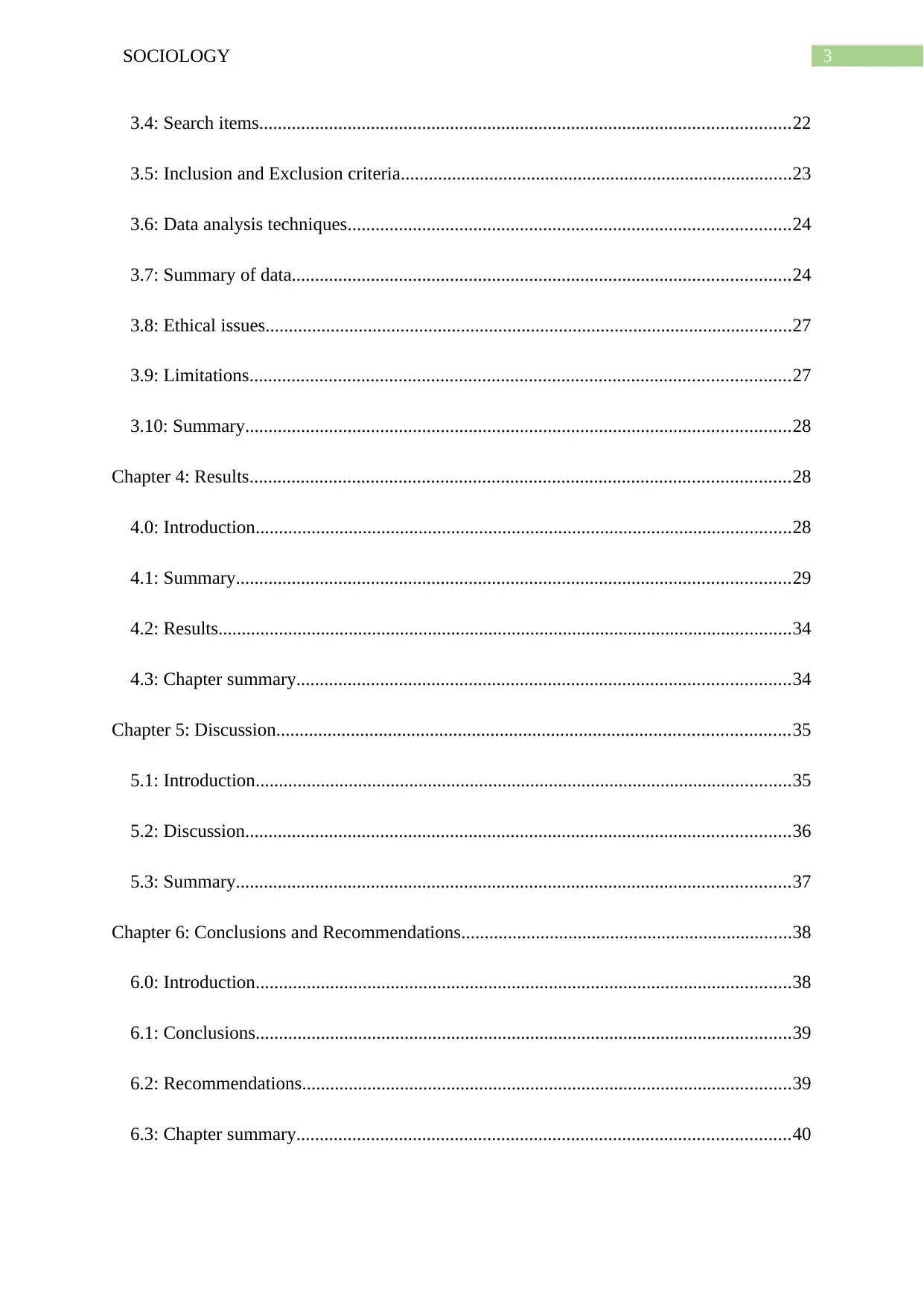
3SOCIOLOGY
3.4: Search items..................................................................................................................22
3.5: Inclusion and Exclusion criteria....................................................................................23
3.6: Data analysis techniques...............................................................................................24
3.7: Summary of data...........................................................................................................24
3.8: Ethical issues.................................................................................................................27
3.9: Limitations....................................................................................................................27
3.10: Summary.....................................................................................................................28
Chapter 4: Results....................................................................................................................28
4.0: Introduction...................................................................................................................28
4.1: Summary.......................................................................................................................29
4.2: Results...........................................................................................................................34
4.3: Chapter summary..........................................................................................................34
Chapter 5: Discussion..............................................................................................................35
5.1: Introduction...................................................................................................................35
5.2: Discussion.....................................................................................................................36
5.3: Summary.......................................................................................................................37
Chapter 6: Conclusions and Recommendations.......................................................................38
6.0: Introduction...................................................................................................................38
6.1: Conclusions...................................................................................................................39
6.2: Recommendations.........................................................................................................39
6.3: Chapter summary..........................................................................................................40
3.4: Search items..................................................................................................................22
3.5: Inclusion and Exclusion criteria....................................................................................23
3.6: Data analysis techniques...............................................................................................24
3.7: Summary of data...........................................................................................................24
3.8: Ethical issues.................................................................................................................27
3.9: Limitations....................................................................................................................27
3.10: Summary.....................................................................................................................28
Chapter 4: Results....................................................................................................................28
4.0: Introduction...................................................................................................................28
4.1: Summary.......................................................................................................................29
4.2: Results...........................................................................................................................34
4.3: Chapter summary..........................................................................................................34
Chapter 5: Discussion..............................................................................................................35
5.1: Introduction...................................................................................................................35
5.2: Discussion.....................................................................................................................36
5.3: Summary.......................................................................................................................37
Chapter 6: Conclusions and Recommendations.......................................................................38
6.0: Introduction...................................................................................................................38
6.1: Conclusions...................................................................................................................39
6.2: Recommendations.........................................................................................................39
6.3: Chapter summary..........................................................................................................40
Paraphrase This Document
Need a fresh take? Get an instant paraphrase of this document with our AI Paraphraser
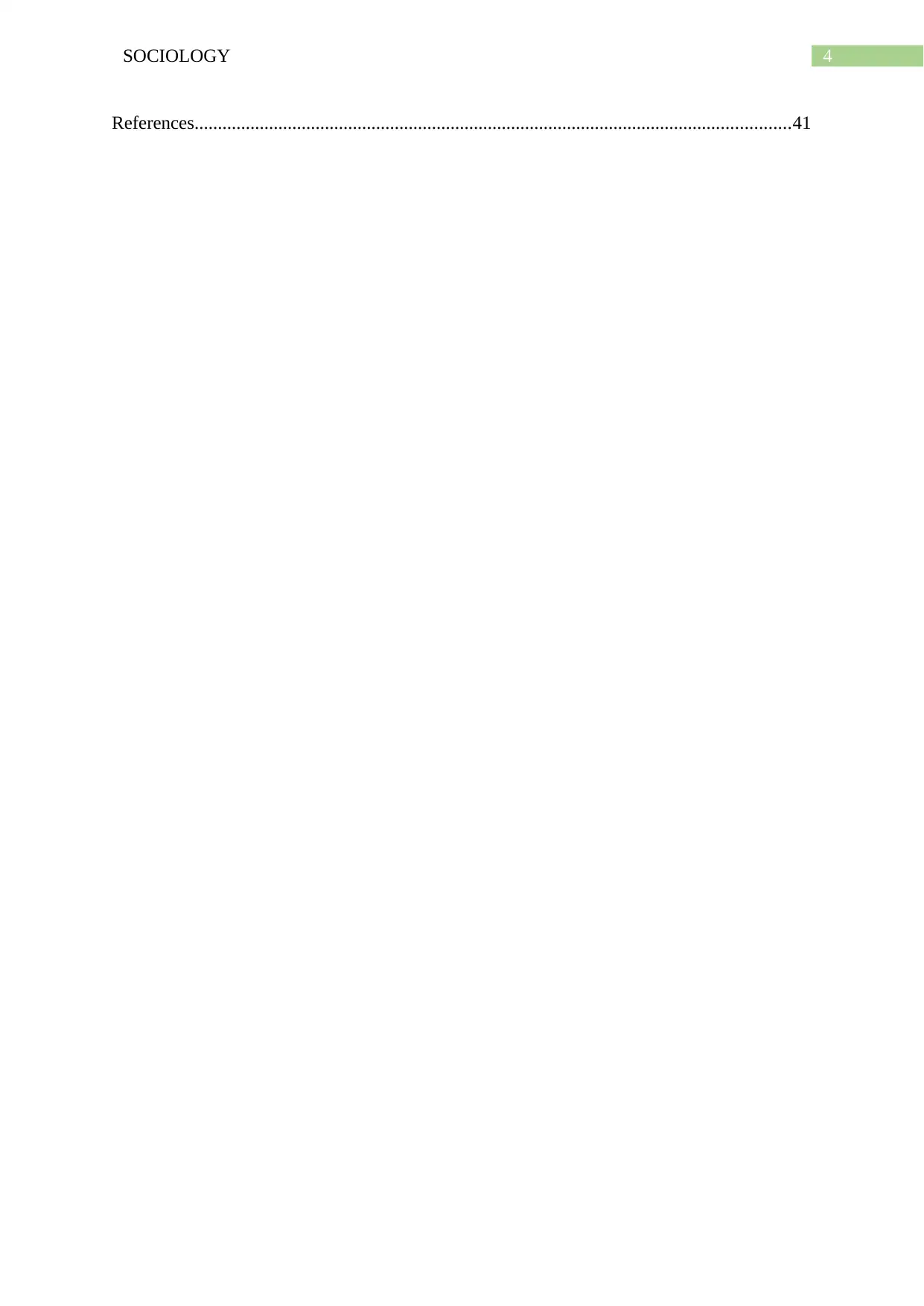
4SOCIOLOGY
References................................................................................................................................41
References................................................................................................................................41
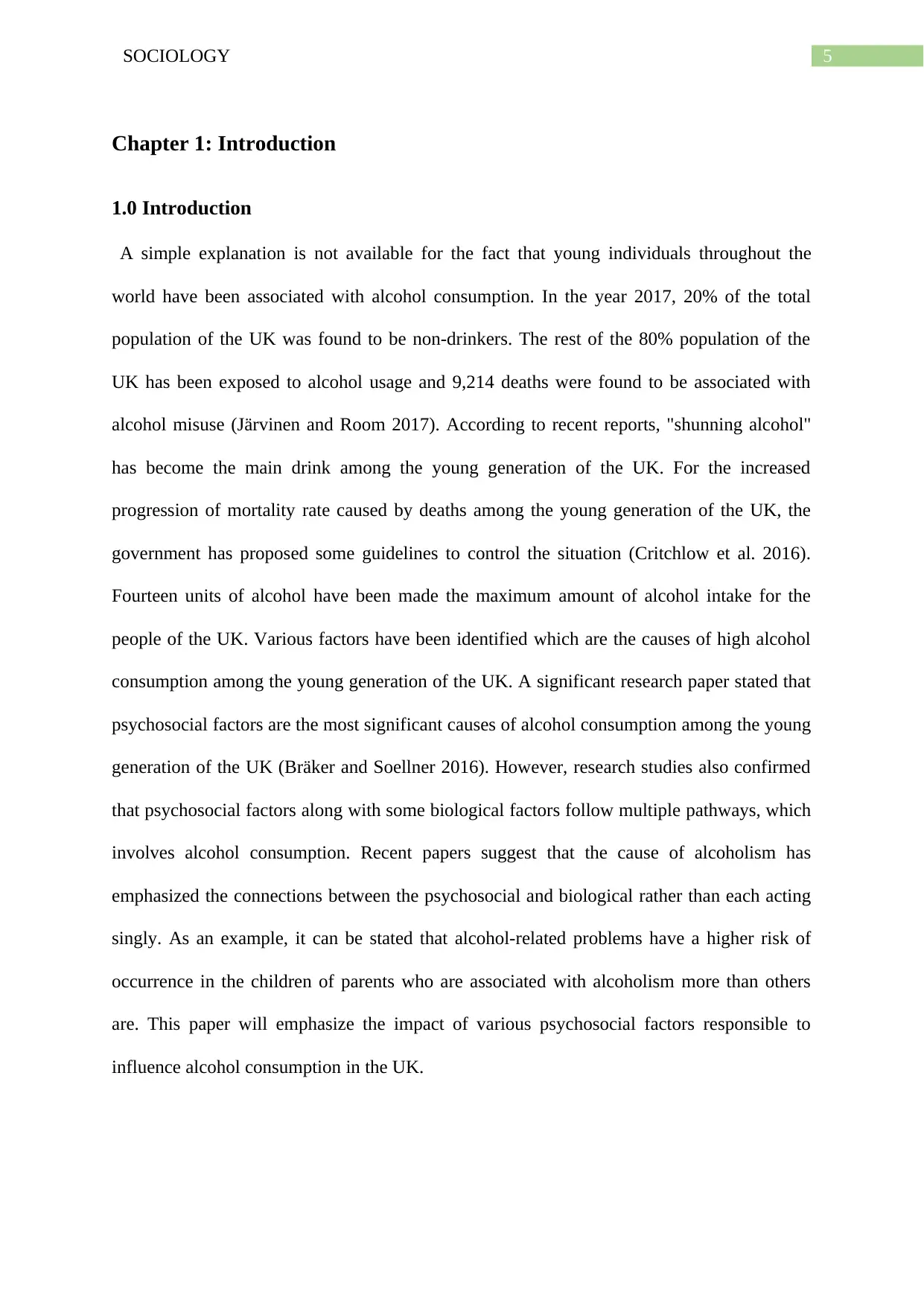
5SOCIOLOGY
Chapter 1: Introduction
1.0 Introduction
A simple explanation is not available for the fact that young individuals throughout the
world have been associated with alcohol consumption. In the year 2017, 20% of the total
population of the UK was found to be non-drinkers. The rest of the 80% population of the
UK has been exposed to alcohol usage and 9,214 deaths were found to be associated with
alcohol misuse (Järvinen and Room 2017). According to recent reports, "shunning alcohol"
has become the main drink among the young generation of the UK. For the increased
progression of mortality rate caused by deaths among the young generation of the UK, the
government has proposed some guidelines to control the situation (Critchlow et al. 2016).
Fourteen units of alcohol have been made the maximum amount of alcohol intake for the
people of the UK. Various factors have been identified which are the causes of high alcohol
consumption among the young generation of the UK. A significant research paper stated that
psychosocial factors are the most significant causes of alcohol consumption among the young
generation of the UK (Bräker and Soellner 2016). However, research studies also confirmed
that psychosocial factors along with some biological factors follow multiple pathways, which
involves alcohol consumption. Recent papers suggest that the cause of alcoholism has
emphasized the connections between the psychosocial and biological rather than each acting
singly. As an example, it can be stated that alcohol-related problems have a higher risk of
occurrence in the children of parents who are associated with alcoholism more than others
are. This paper will emphasize the impact of various psychosocial factors responsible to
influence alcohol consumption in the UK.
Chapter 1: Introduction
1.0 Introduction
A simple explanation is not available for the fact that young individuals throughout the
world have been associated with alcohol consumption. In the year 2017, 20% of the total
population of the UK was found to be non-drinkers. The rest of the 80% population of the
UK has been exposed to alcohol usage and 9,214 deaths were found to be associated with
alcohol misuse (Järvinen and Room 2017). According to recent reports, "shunning alcohol"
has become the main drink among the young generation of the UK. For the increased
progression of mortality rate caused by deaths among the young generation of the UK, the
government has proposed some guidelines to control the situation (Critchlow et al. 2016).
Fourteen units of alcohol have been made the maximum amount of alcohol intake for the
people of the UK. Various factors have been identified which are the causes of high alcohol
consumption among the young generation of the UK. A significant research paper stated that
psychosocial factors are the most significant causes of alcohol consumption among the young
generation of the UK (Bräker and Soellner 2016). However, research studies also confirmed
that psychosocial factors along with some biological factors follow multiple pathways, which
involves alcohol consumption. Recent papers suggest that the cause of alcoholism has
emphasized the connections between the psychosocial and biological rather than each acting
singly. As an example, it can be stated that alcohol-related problems have a higher risk of
occurrence in the children of parents who are associated with alcoholism more than others
are. This paper will emphasize the impact of various psychosocial factors responsible to
influence alcohol consumption in the UK.
⊘ This is a preview!⊘
Do you want full access?
Subscribe today to unlock all pages.

Trusted by 1+ million students worldwide
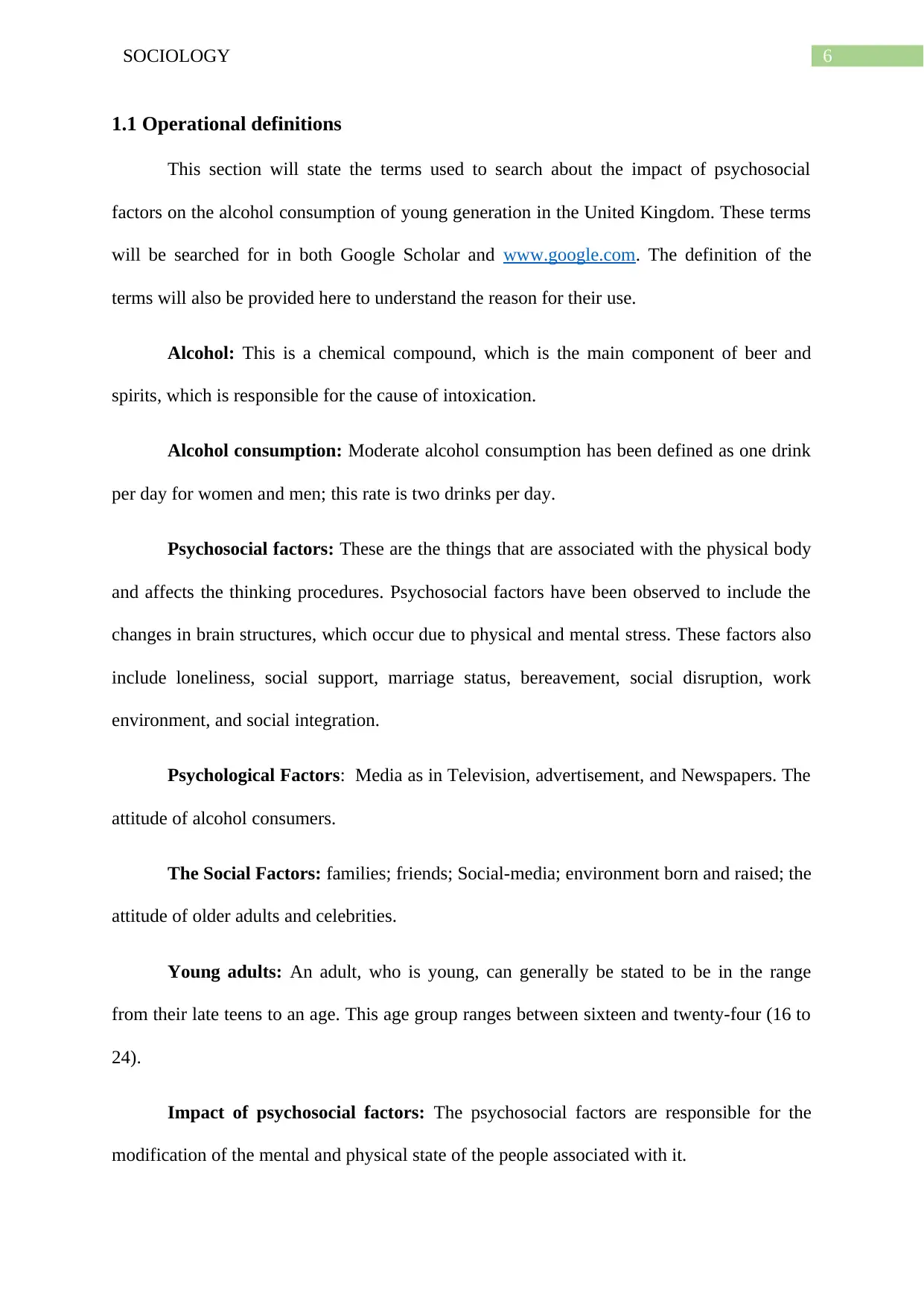
6SOCIOLOGY
1.1 Operational definitions
This section will state the terms used to search about the impact of psychosocial
factors on the alcohol consumption of young generation in the United Kingdom. These terms
will be searched for in both Google Scholar and www.google.com. The definition of the
terms will also be provided here to understand the reason for their use.
Alcohol: This is a chemical compound, which is the main component of beer and
spirits, which is responsible for the cause of intoxication.
Alcohol consumption: Moderate alcohol consumption has been defined as one drink
per day for women and men; this rate is two drinks per day.
Psychosocial factors: These are the things that are associated with the physical body
and affects the thinking procedures. Psychosocial factors have been observed to include the
changes in brain structures, which occur due to physical and mental stress. These factors also
include loneliness, social support, marriage status, bereavement, social disruption, work
environment, and social integration.
Psychological Factors: Media as in Television, advertisement, and Newspapers. The
attitude of alcohol consumers.
The Social Factors: families; friends; Social-media; environment born and raised; the
attitude of older adults and celebrities.
Young adults: An adult, who is young, can generally be stated to be in the range
from their late teens to an age. This age group ranges between sixteen and twenty-four (16 to
24).
Impact of psychosocial factors: The psychosocial factors are responsible for the
modification of the mental and physical state of the people associated with it.
1.1 Operational definitions
This section will state the terms used to search about the impact of psychosocial
factors on the alcohol consumption of young generation in the United Kingdom. These terms
will be searched for in both Google Scholar and www.google.com. The definition of the
terms will also be provided here to understand the reason for their use.
Alcohol: This is a chemical compound, which is the main component of beer and
spirits, which is responsible for the cause of intoxication.
Alcohol consumption: Moderate alcohol consumption has been defined as one drink
per day for women and men; this rate is two drinks per day.
Psychosocial factors: These are the things that are associated with the physical body
and affects the thinking procedures. Psychosocial factors have been observed to include the
changes in brain structures, which occur due to physical and mental stress. These factors also
include loneliness, social support, marriage status, bereavement, social disruption, work
environment, and social integration.
Psychological Factors: Media as in Television, advertisement, and Newspapers. The
attitude of alcohol consumers.
The Social Factors: families; friends; Social-media; environment born and raised; the
attitude of older adults and celebrities.
Young adults: An adult, who is young, can generally be stated to be in the range
from their late teens to an age. This age group ranges between sixteen and twenty-four (16 to
24).
Impact of psychosocial factors: The psychosocial factors are responsible for the
modification of the mental and physical state of the people associated with it.
Paraphrase This Document
Need a fresh take? Get an instant paraphrase of this document with our AI Paraphraser
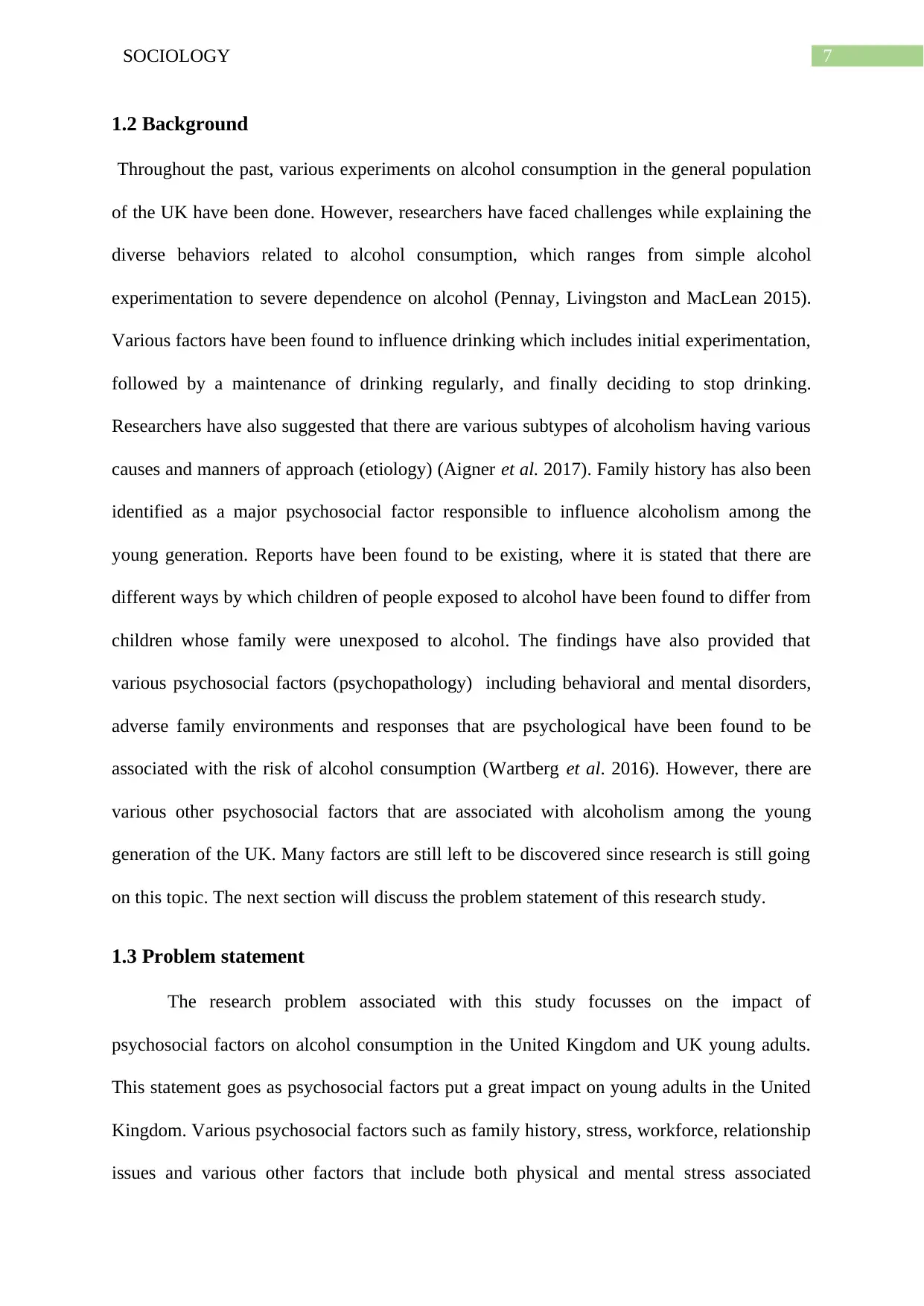
7SOCIOLOGY
1.2 Background
Throughout the past, various experiments on alcohol consumption in the general population
of the UK have been done. However, researchers have faced challenges while explaining the
diverse behaviors related to alcohol consumption, which ranges from simple alcohol
experimentation to severe dependence on alcohol (Pennay, Livingston and MacLean 2015).
Various factors have been found to influence drinking which includes initial experimentation,
followed by a maintenance of drinking regularly, and finally deciding to stop drinking.
Researchers have also suggested that there are various subtypes of alcoholism having various
causes and manners of approach (etiology) (Aigner et al. 2017). Family history has also been
identified as a major psychosocial factor responsible to influence alcoholism among the
young generation. Reports have been found to be existing, where it is stated that there are
different ways by which children of people exposed to alcohol have been found to differ from
children whose family were unexposed to alcohol. The findings have also provided that
various psychosocial factors (psychopathology) including behavioral and mental disorders,
adverse family environments and responses that are psychological have been found to be
associated with the risk of alcohol consumption (Wartberg et al. 2016). However, there are
various other psychosocial factors that are associated with alcoholism among the young
generation of the UK. Many factors are still left to be discovered since research is still going
on this topic. The next section will discuss the problem statement of this research study.
1.3 Problem statement
The research problem associated with this study focusses on the impact of
psychosocial factors on alcohol consumption in the United Kingdom and UK young adults.
This statement goes as psychosocial factors put a great impact on young adults in the United
Kingdom. Various psychosocial factors such as family history, stress, workforce, relationship
issues and various other factors that include both physical and mental stress associated
1.2 Background
Throughout the past, various experiments on alcohol consumption in the general population
of the UK have been done. However, researchers have faced challenges while explaining the
diverse behaviors related to alcohol consumption, which ranges from simple alcohol
experimentation to severe dependence on alcohol (Pennay, Livingston and MacLean 2015).
Various factors have been found to influence drinking which includes initial experimentation,
followed by a maintenance of drinking regularly, and finally deciding to stop drinking.
Researchers have also suggested that there are various subtypes of alcoholism having various
causes and manners of approach (etiology) (Aigner et al. 2017). Family history has also been
identified as a major psychosocial factor responsible to influence alcoholism among the
young generation. Reports have been found to be existing, where it is stated that there are
different ways by which children of people exposed to alcohol have been found to differ from
children whose family were unexposed to alcohol. The findings have also provided that
various psychosocial factors (psychopathology) including behavioral and mental disorders,
adverse family environments and responses that are psychological have been found to be
associated with the risk of alcohol consumption (Wartberg et al. 2016). However, there are
various other psychosocial factors that are associated with alcoholism among the young
generation of the UK. Many factors are still left to be discovered since research is still going
on this topic. The next section will discuss the problem statement of this research study.
1.3 Problem statement
The research problem associated with this study focusses on the impact of
psychosocial factors on alcohol consumption in the United Kingdom and UK young adults.
This statement goes as psychosocial factors put a great impact on young adults in the United
Kingdom. Various psychosocial factors such as family history, stress, workforce, relationship
issues and various other factors that include both physical and mental stress associated
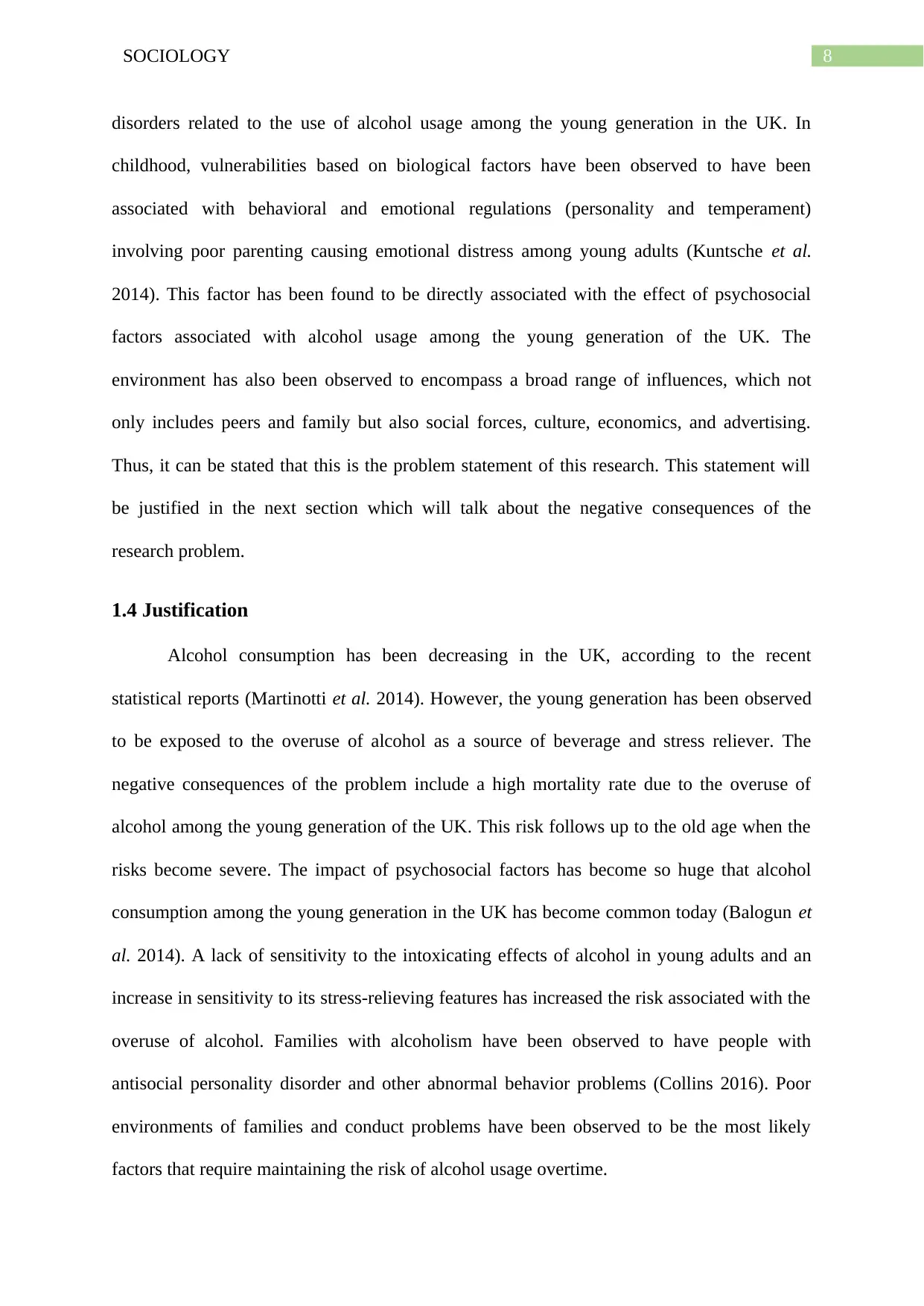
8SOCIOLOGY
disorders related to the use of alcohol usage among the young generation in the UK. In
childhood, vulnerabilities based on biological factors have been observed to have been
associated with behavioral and emotional regulations (personality and temperament)
involving poor parenting causing emotional distress among young adults (Kuntsche et al.
2014). This factor has been found to be directly associated with the effect of psychosocial
factors associated with alcohol usage among the young generation of the UK. The
environment has also been observed to encompass a broad range of influences, which not
only includes peers and family but also social forces, culture, economics, and advertising.
Thus, it can be stated that this is the problem statement of this research. This statement will
be justified in the next section which will talk about the negative consequences of the
research problem.
1.4 Justification
Alcohol consumption has been decreasing in the UK, according to the recent
statistical reports (Martinotti et al. 2014). However, the young generation has been observed
to be exposed to the overuse of alcohol as a source of beverage and stress reliever. The
negative consequences of the problem include a high mortality rate due to the overuse of
alcohol among the young generation of the UK. This risk follows up to the old age when the
risks become severe. The impact of psychosocial factors has become so huge that alcohol
consumption among the young generation in the UK has become common today (Balogun et
al. 2014). A lack of sensitivity to the intoxicating effects of alcohol in young adults and an
increase in sensitivity to its stress-relieving features has increased the risk associated with the
overuse of alcohol. Families with alcoholism have been observed to have people with
antisocial personality disorder and other abnormal behavior problems (Collins 2016). Poor
environments of families and conduct problems have been observed to be the most likely
factors that require maintaining the risk of alcohol usage overtime.
disorders related to the use of alcohol usage among the young generation in the UK. In
childhood, vulnerabilities based on biological factors have been observed to have been
associated with behavioral and emotional regulations (personality and temperament)
involving poor parenting causing emotional distress among young adults (Kuntsche et al.
2014). This factor has been found to be directly associated with the effect of psychosocial
factors associated with alcohol usage among the young generation of the UK. The
environment has also been observed to encompass a broad range of influences, which not
only includes peers and family but also social forces, culture, economics, and advertising.
Thus, it can be stated that this is the problem statement of this research. This statement will
be justified in the next section which will talk about the negative consequences of the
research problem.
1.4 Justification
Alcohol consumption has been decreasing in the UK, according to the recent
statistical reports (Martinotti et al. 2014). However, the young generation has been observed
to be exposed to the overuse of alcohol as a source of beverage and stress reliever. The
negative consequences of the problem include a high mortality rate due to the overuse of
alcohol among the young generation of the UK. This risk follows up to the old age when the
risks become severe. The impact of psychosocial factors has become so huge that alcohol
consumption among the young generation in the UK has become common today (Balogun et
al. 2014). A lack of sensitivity to the intoxicating effects of alcohol in young adults and an
increase in sensitivity to its stress-relieving features has increased the risk associated with the
overuse of alcohol. Families with alcoholism have been observed to have people with
antisocial personality disorder and other abnormal behavior problems (Collins 2016). Poor
environments of families and conduct problems have been observed to be the most likely
factors that require maintaining the risk of alcohol usage overtime.
⊘ This is a preview!⊘
Do you want full access?
Subscribe today to unlock all pages.

Trusted by 1+ million students worldwide
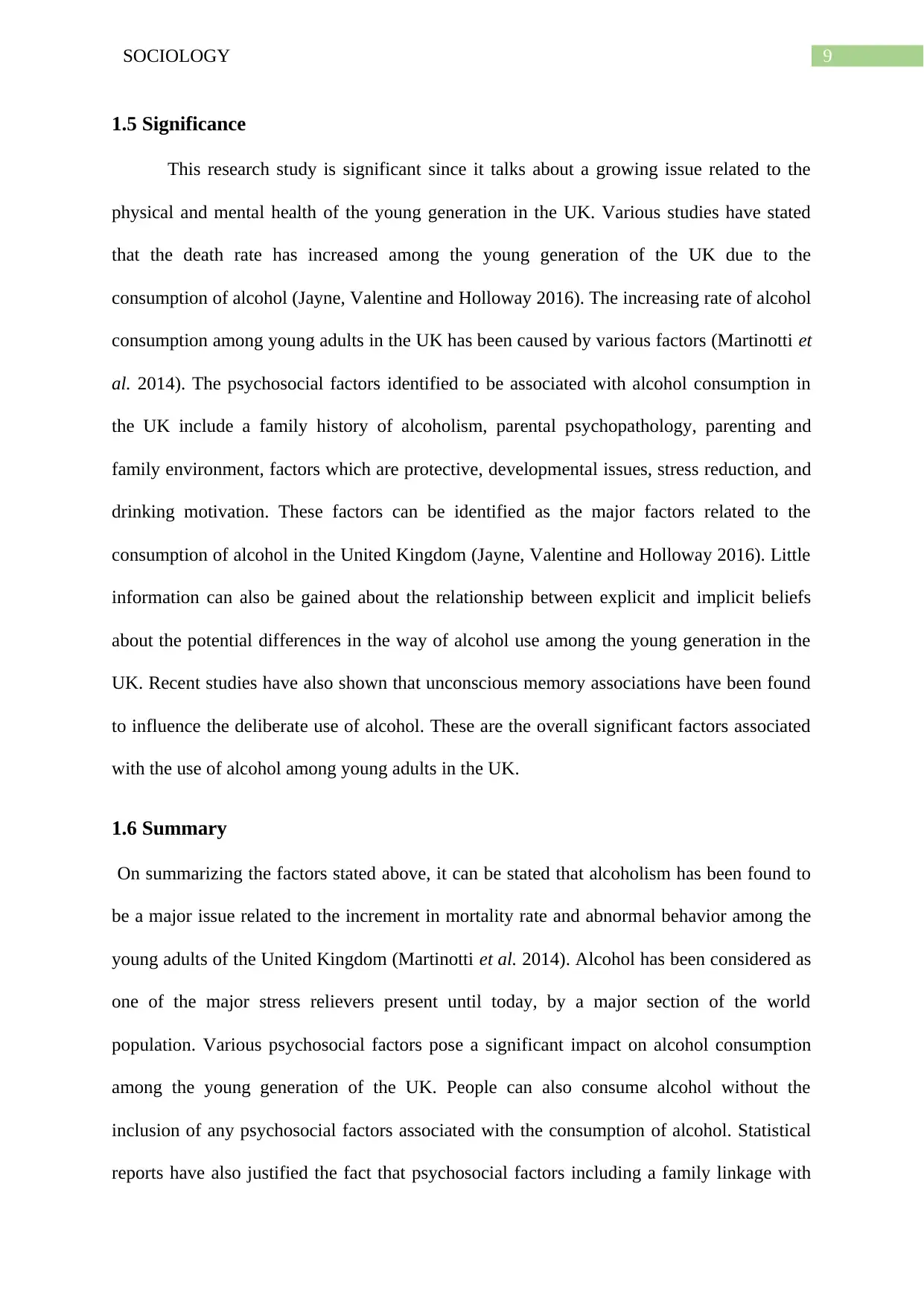
9SOCIOLOGY
1.5 Significance
This research study is significant since it talks about a growing issue related to the
physical and mental health of the young generation in the UK. Various studies have stated
that the death rate has increased among the young generation of the UK due to the
consumption of alcohol (Jayne, Valentine and Holloway 2016). The increasing rate of alcohol
consumption among young adults in the UK has been caused by various factors (Martinotti et
al. 2014). The psychosocial factors identified to be associated with alcohol consumption in
the UK include a family history of alcoholism, parental psychopathology, parenting and
family environment, factors which are protective, developmental issues, stress reduction, and
drinking motivation. These factors can be identified as the major factors related to the
consumption of alcohol in the United Kingdom (Jayne, Valentine and Holloway 2016). Little
information can also be gained about the relationship between explicit and implicit beliefs
about the potential differences in the way of alcohol use among the young generation in the
UK. Recent studies have also shown that unconscious memory associations have been found
to influence the deliberate use of alcohol. These are the overall significant factors associated
with the use of alcohol among young adults in the UK.
1.6 Summary
On summarizing the factors stated above, it can be stated that alcoholism has been found to
be a major issue related to the increment in mortality rate and abnormal behavior among the
young adults of the United Kingdom (Martinotti et al. 2014). Alcohol has been considered as
one of the major stress relievers present until today, by a major section of the world
population. Various psychosocial factors pose a significant impact on alcohol consumption
among the young generation of the UK. People can also consume alcohol without the
inclusion of any psychosocial factors associated with the consumption of alcohol. Statistical
reports have also justified the fact that psychosocial factors including a family linkage with
1.5 Significance
This research study is significant since it talks about a growing issue related to the
physical and mental health of the young generation in the UK. Various studies have stated
that the death rate has increased among the young generation of the UK due to the
consumption of alcohol (Jayne, Valentine and Holloway 2016). The increasing rate of alcohol
consumption among young adults in the UK has been caused by various factors (Martinotti et
al. 2014). The psychosocial factors identified to be associated with alcohol consumption in
the UK include a family history of alcoholism, parental psychopathology, parenting and
family environment, factors which are protective, developmental issues, stress reduction, and
drinking motivation. These factors can be identified as the major factors related to the
consumption of alcohol in the United Kingdom (Jayne, Valentine and Holloway 2016). Little
information can also be gained about the relationship between explicit and implicit beliefs
about the potential differences in the way of alcohol use among the young generation in the
UK. Recent studies have also shown that unconscious memory associations have been found
to influence the deliberate use of alcohol. These are the overall significant factors associated
with the use of alcohol among young adults in the UK.
1.6 Summary
On summarizing the factors stated above, it can be stated that alcoholism has been found to
be a major issue related to the increment in mortality rate and abnormal behavior among the
young adults of the United Kingdom (Martinotti et al. 2014). Alcohol has been considered as
one of the major stress relievers present until today, by a major section of the world
population. Various psychosocial factors pose a significant impact on alcohol consumption
among the young generation of the UK. People can also consume alcohol without the
inclusion of any psychosocial factors associated with the consumption of alcohol. Statistical
reports have also justified the fact that psychosocial factors including a family linkage with
Paraphrase This Document
Need a fresh take? Get an instant paraphrase of this document with our AI Paraphraser
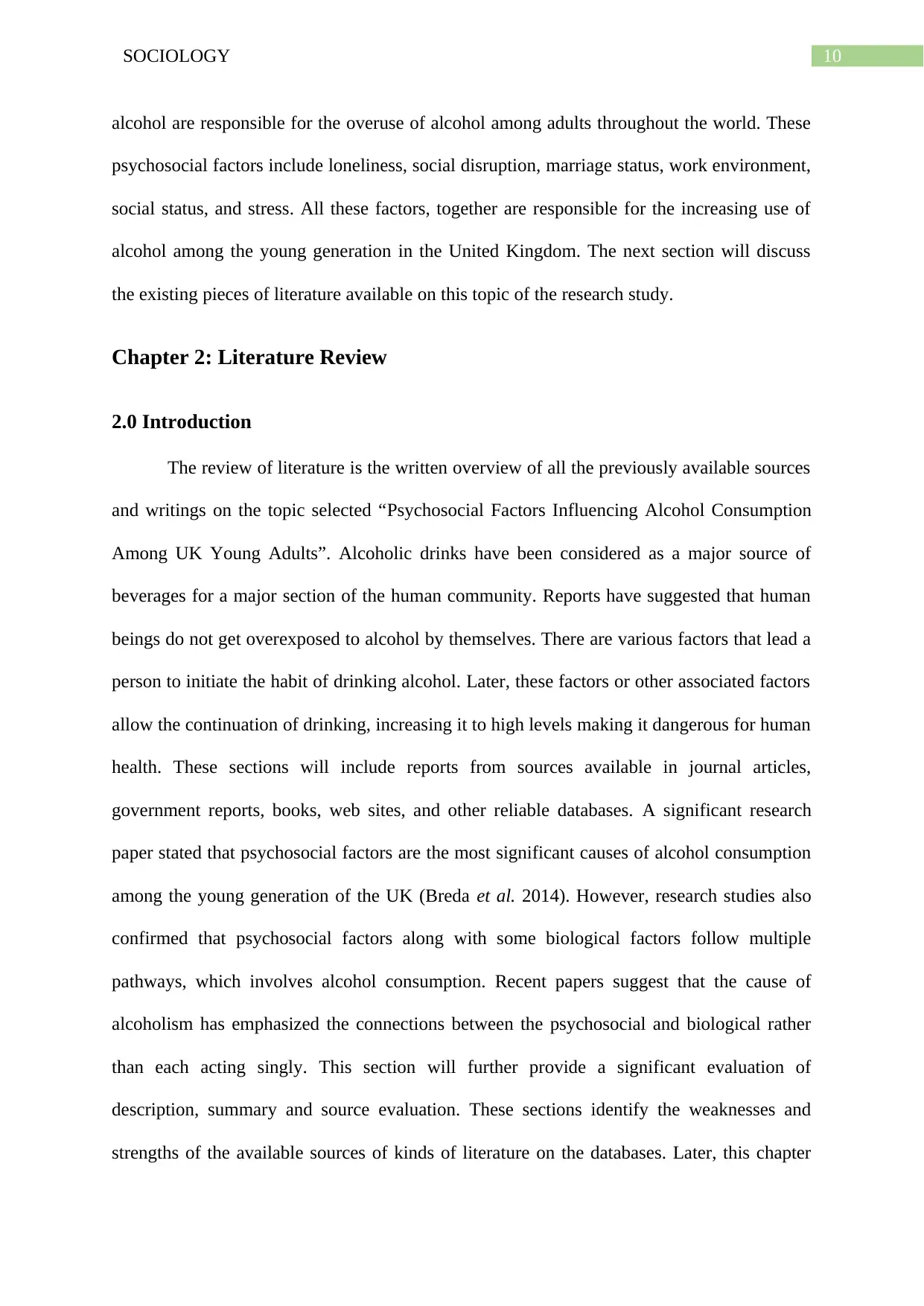
10SOCIOLOGY
alcohol are responsible for the overuse of alcohol among adults throughout the world. These
psychosocial factors include loneliness, social disruption, marriage status, work environment,
social status, and stress. All these factors, together are responsible for the increasing use of
alcohol among the young generation in the United Kingdom. The next section will discuss
the existing pieces of literature available on this topic of the research study.
Chapter 2: Literature Review
2.0 Introduction
The review of literature is the written overview of all the previously available sources
and writings on the topic selected “Psychosocial Factors Influencing Alcohol Consumption
Among UK Young Adults”. Alcoholic drinks have been considered as a major source of
beverages for a major section of the human community. Reports have suggested that human
beings do not get overexposed to alcohol by themselves. There are various factors that lead a
person to initiate the habit of drinking alcohol. Later, these factors or other associated factors
allow the continuation of drinking, increasing it to high levels making it dangerous for human
health. These sections will include reports from sources available in journal articles,
government reports, books, web sites, and other reliable databases. A significant research
paper stated that psychosocial factors are the most significant causes of alcohol consumption
among the young generation of the UK (Breda et al. 2014). However, research studies also
confirmed that psychosocial factors along with some biological factors follow multiple
pathways, which involves alcohol consumption. Recent papers suggest that the cause of
alcoholism has emphasized the connections between the psychosocial and biological rather
than each acting singly. This section will further provide a significant evaluation of
description, summary and source evaluation. These sections identify the weaknesses and
strengths of the available sources of kinds of literature on the databases. Later, this chapter
alcohol are responsible for the overuse of alcohol among adults throughout the world. These
psychosocial factors include loneliness, social disruption, marriage status, work environment,
social status, and stress. All these factors, together are responsible for the increasing use of
alcohol among the young generation in the United Kingdom. The next section will discuss
the existing pieces of literature available on this topic of the research study.
Chapter 2: Literature Review
2.0 Introduction
The review of literature is the written overview of all the previously available sources
and writings on the topic selected “Psychosocial Factors Influencing Alcohol Consumption
Among UK Young Adults”. Alcoholic drinks have been considered as a major source of
beverages for a major section of the human community. Reports have suggested that human
beings do not get overexposed to alcohol by themselves. There are various factors that lead a
person to initiate the habit of drinking alcohol. Later, these factors or other associated factors
allow the continuation of drinking, increasing it to high levels making it dangerous for human
health. These sections will include reports from sources available in journal articles,
government reports, books, web sites, and other reliable databases. A significant research
paper stated that psychosocial factors are the most significant causes of alcohol consumption
among the young generation of the UK (Breda et al. 2014). However, research studies also
confirmed that psychosocial factors along with some biological factors follow multiple
pathways, which involves alcohol consumption. Recent papers suggest that the cause of
alcoholism has emphasized the connections between the psychosocial and biological rather
than each acting singly. This section will further provide a significant evaluation of
description, summary and source evaluation. These sections identify the weaknesses and
strengths of the available sources of kinds of literature on the databases. Later, this chapter
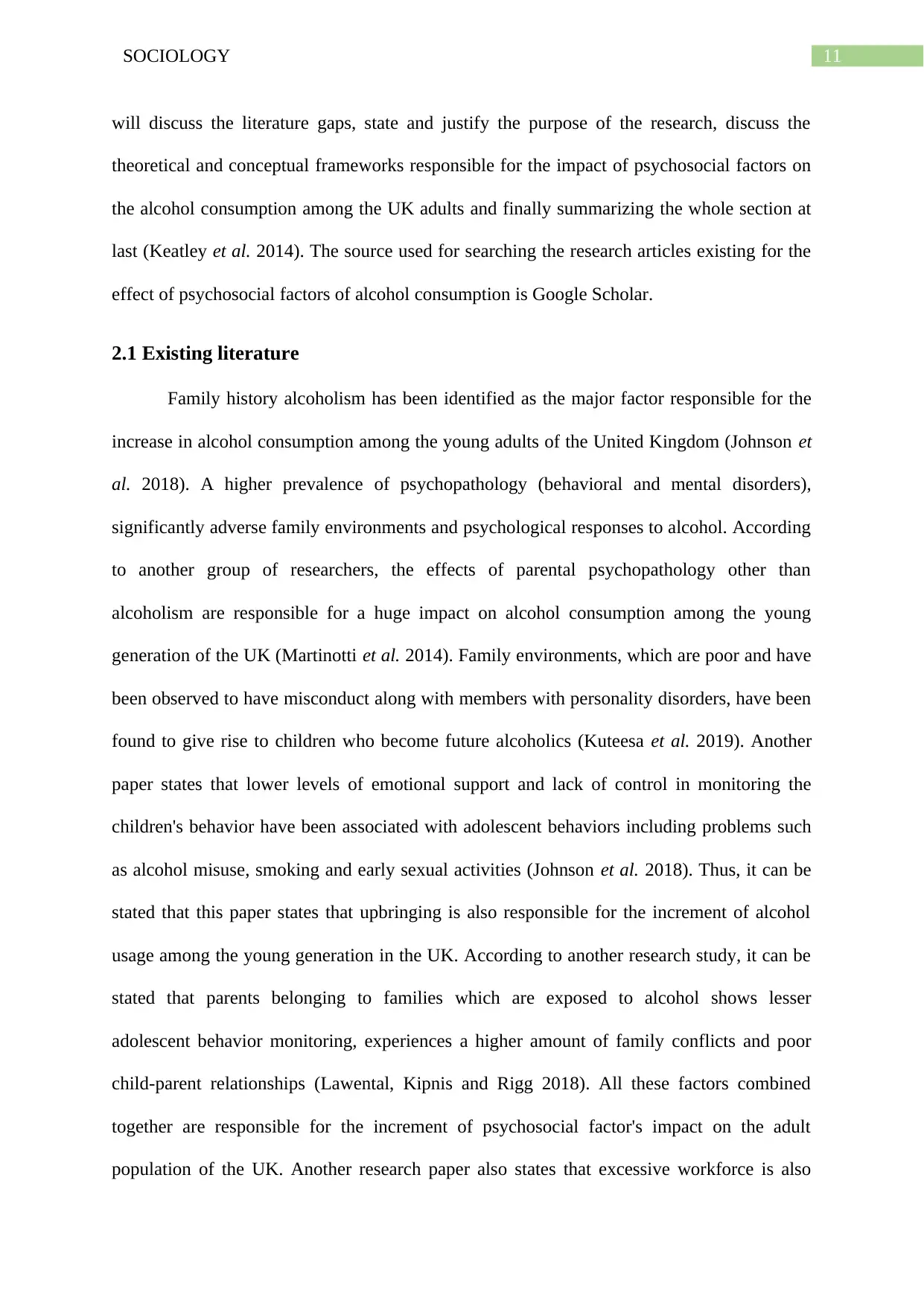
11SOCIOLOGY
will discuss the literature gaps, state and justify the purpose of the research, discuss the
theoretical and conceptual frameworks responsible for the impact of psychosocial factors on
the alcohol consumption among the UK adults and finally summarizing the whole section at
last (Keatley et al. 2014). The source used for searching the research articles existing for the
effect of psychosocial factors of alcohol consumption is Google Scholar.
2.1 Existing literature
Family history alcoholism has been identified as the major factor responsible for the
increase in alcohol consumption among the young adults of the United Kingdom (Johnson et
al. 2018). A higher prevalence of psychopathology (behavioral and mental disorders),
significantly adverse family environments and psychological responses to alcohol. According
to another group of researchers, the effects of parental psychopathology other than
alcoholism are responsible for a huge impact on alcohol consumption among the young
generation of the UK (Martinotti et al. 2014). Family environments, which are poor and have
been observed to have misconduct along with members with personality disorders, have been
found to give rise to children who become future alcoholics (Kuteesa et al. 2019). Another
paper states that lower levels of emotional support and lack of control in monitoring the
children's behavior have been associated with adolescent behaviors including problems such
as alcohol misuse, smoking and early sexual activities (Johnson et al. 2018). Thus, it can be
stated that this paper states that upbringing is also responsible for the increment of alcohol
usage among the young generation in the UK. According to another research study, it can be
stated that parents belonging to families which are exposed to alcohol shows lesser
adolescent behavior monitoring, experiences a higher amount of family conflicts and poor
child-parent relationships (Lawental, Kipnis and Rigg 2018). All these factors combined
together are responsible for the increment of psychosocial factor's impact on the adult
population of the UK. Another research paper also states that excessive workforce is also
will discuss the literature gaps, state and justify the purpose of the research, discuss the
theoretical and conceptual frameworks responsible for the impact of psychosocial factors on
the alcohol consumption among the UK adults and finally summarizing the whole section at
last (Keatley et al. 2014). The source used for searching the research articles existing for the
effect of psychosocial factors of alcohol consumption is Google Scholar.
2.1 Existing literature
Family history alcoholism has been identified as the major factor responsible for the
increase in alcohol consumption among the young adults of the United Kingdom (Johnson et
al. 2018). A higher prevalence of psychopathology (behavioral and mental disorders),
significantly adverse family environments and psychological responses to alcohol. According
to another group of researchers, the effects of parental psychopathology other than
alcoholism are responsible for a huge impact on alcohol consumption among the young
generation of the UK (Martinotti et al. 2014). Family environments, which are poor and have
been observed to have misconduct along with members with personality disorders, have been
found to give rise to children who become future alcoholics (Kuteesa et al. 2019). Another
paper states that lower levels of emotional support and lack of control in monitoring the
children's behavior have been associated with adolescent behaviors including problems such
as alcohol misuse, smoking and early sexual activities (Johnson et al. 2018). Thus, it can be
stated that this paper states that upbringing is also responsible for the increment of alcohol
usage among the young generation in the UK. According to another research study, it can be
stated that parents belonging to families which are exposed to alcohol shows lesser
adolescent behavior monitoring, experiences a higher amount of family conflicts and poor
child-parent relationships (Lawental, Kipnis and Rigg 2018). All these factors combined
together are responsible for the increment of psychosocial factor's impact on the adult
population of the UK. Another research paper also states that excessive workforce is also
⊘ This is a preview!⊘
Do you want full access?
Subscribe today to unlock all pages.

Trusted by 1+ million students worldwide
1 out of 47
Related Documents
Your All-in-One AI-Powered Toolkit for Academic Success.
+13062052269
info@desklib.com
Available 24*7 on WhatsApp / Email
![[object Object]](/_next/static/media/star-bottom.7253800d.svg)
Unlock your academic potential
Copyright © 2020–2026 A2Z Services. All Rights Reserved. Developed and managed by ZUCOL.





